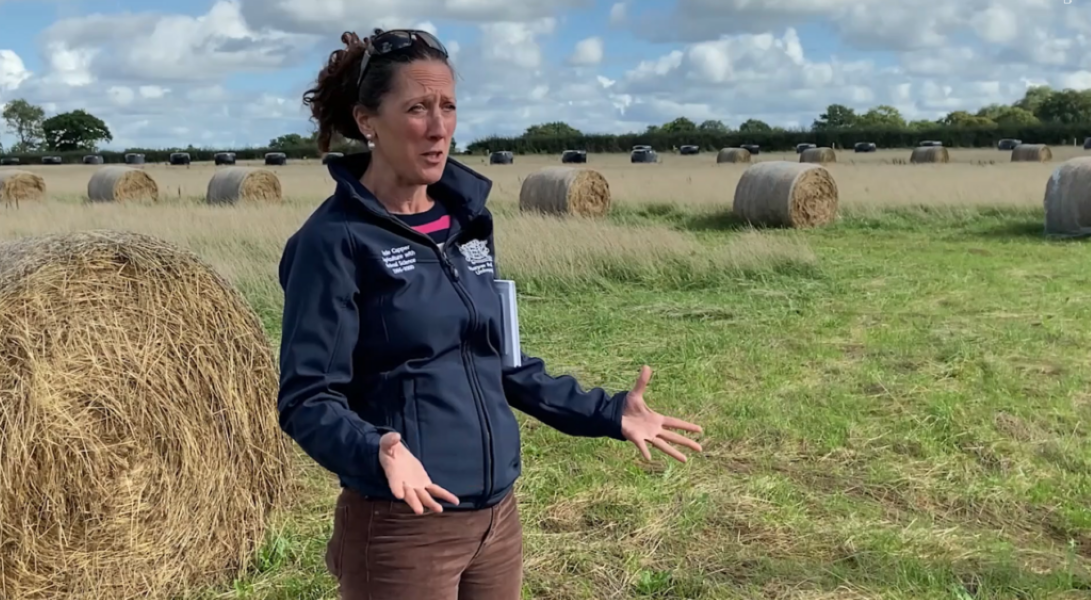Beef and lamb farmers as well as agricultural technical experts gathered on a suckler-beef farm in Cheshire recently to get a first look at initial findings from research which aims to help red meat producers reduce their carbon footprint.
The grazing and knowledge transfer event took place as part of ABP Food Group’s PRISM 2030 (PRogramme for the Improvement in Sustainability of (red) Meat) initiative.
The open day took place near Mobberley, Cheshire, on the farm of Ian Norbury and attendees heard the changes he has implemented on his farm since joining PRISM 2030.
Ian manages a herd of 120 pedigree Angus cows, selling breeding bulls and also finishes his heifers and steers with ABP.
He joined PRISM 2030 in autumn 2022 having already used the carbon calculator, Agrecalc, to measure his farm’s GHG emissions back in 2020.
An overview video explaining the farm system can be found here:
After gauging his farm emissions, the Cheshire beef farmer then identified ways to reduce emissions, primarily planting herbal leys and rotationally grazing cattle, eliminating chemical fertiliser requirements, and improving daily liveweight gains.
He now out winters finishing cattle and supplements these with bales. Only in-calf cows are housed during late winter and this system minimises straw use and keeps nitrogen on the grassland.
Many of the forage bales made on the farm are tight-baled hay and require no wrap, eliminating plastic waste, reducing input costs, and minimising labour demands during winter.
Regular weighing of cattle means he can select smaller heifers for breeding and finish larger-framed heifers, monitoring growth rates and feeding accordingly.
Ian has reduced mature cow weight from 780kg to 650kg over the past four years, reducing the overall carbon footprint of each cow.
PRISM 2030 offered Ian the opportunity he sought, to repeat his carbon calculations with Agrecalc, and presented him with advice from The Andersons Centre, Harper Adams University and other farmers involved.
During the event, farmers from across the region heard from ABP’s PRISM 2030 partners Professor Jude Capper of Harper Adams University as well as representatives from The Andersons Centre (Andersons) and Agrecalc.
Professor Capper told farmers at the event in Cheshire that the findings from the project so far are proving “helpful” in illustrating “just how much those involved are achieving by monitoring and reducing their farm carbon emissions, with the support of ABP”.
She said: “It’s really important for our industry which faces arguably more than its fair share of criticism to be armed with much more accurate, representative data which we can point to”.
“We already know some of the broad factors which effects the carbon footprint of a farm but what we don’t is how that plays out on-farm.
“Often, we see two similar farms but with very different carbon footprints. We also see seemingly high-performing farms, which in theory ought to have a lower carbon footprint, having higher ones than lesser-performing farms. This project will help us to understand why.”
Discussing the different aspects of the farm, The Andersons Centre and Agrecalc representatives explained their role in assessing farm carbon emissions and offering recommendations.
Ian gave insight into his handling system investment and discussed the planting and management of GS4 (herbal) leys and led a tour of the bale grazing set-up, ready for cattle to turn out to during November.
Through PRISM 2030, ABP hosts discussion groups, gives advice and offers a Sustainability Grant, to support investment with improvements such as herbal ley mixtures, weighing-scales and handling systems.
Katie Thorley, ABP’s agri-sustainability manager said: “This research project is vital for supporting farmers and communicating UK agriculture’s strong sustainability position.
“Investing in PRISM is partly about telling the story of British farming.
“There is no doubt in my mind that many consumers have negative connotations around the impacts of farming, and we must get our act together to tell the real story.
“Every farm will be re-tested in two years’ time, and we very much look forward to watching PRISM 2030 progress and finding out what the next chapters reveal.”

